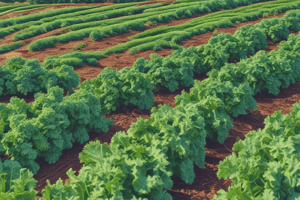Podcast
Questions and Answers
What is the main threat to kale crops caused by a fungal disease, and how long can it persist in the soil?
What is the main threat to kale crops caused by a fungal disease, and how long can it persist in the soil?
The main threat is club root, and it can persist in the soil for up to 20 years.
What is a suggested strategy to manage club root levels in kale cultivation?
What is a suggested strategy to manage club root levels in kale cultivation?
A one in five year rotation for brassicas is suggested to keep club root levels low.
Identify a critical method for controlling weeds during the kale cultivation process.
Identify a critical method for controlling weeds during the kale cultivation process.
Spraying a glyphosate prior to sowing is essential to remove weeds.
Which insect is the most damaging pest to kale, particularly during warm weather?
Which insect is the most damaging pest to kale, particularly during warm weather?
What is the role of soil structure in the cultivation of kale?
What is the role of soil structure in the cultivation of kale?
What is the primary purpose of a cover crop like Kale?
What is the primary purpose of a cover crop like Kale?
How does a catch crop differ from a cash crop?
How does a catch crop differ from a cash crop?
What are the benefits of ploughing a catch crop like Kale back into the soil?
What are the benefits of ploughing a catch crop like Kale back into the soil?
Why might a farmer choose to plant Kale as a catch crop?
Why might a farmer choose to plant Kale as a catch crop?
Mention one disadvantage of using Kale as a catch crop.
Mention one disadvantage of using Kale as a catch crop.
What characteristic makes Kale a suitable example of both a catch crop and a cover crop?
What characteristic makes Kale a suitable example of both a catch crop and a cover crop?
Identify another example of a catch crop besides Kale.
Identify another example of a catch crop besides Kale.
What type of crops are specifically grown for energy production, and how do they differ from catch crops?
What type of crops are specifically grown for energy production, and how do they differ from catch crops?
Flashcards are hidden until you start studying
Study Notes
Cover Crop
- Cover crops protect and enrich the soil, managing erosion, fertility, and quality.
- They can grow after cash crops and may thrive over winter.
Cash Crop
- A cash crop is cultivated primarily for profit, rather than subsistence.
Catch Crop
- A catch crop is a fast-growing crop sown between main crop plantings, often for animal feed.
- Kale serves as an example of a catch crop but is also classified as a cover crop.
- Ploughing catch crops back into soil enhances soil structure.
Other Catch Crops
- Cabbage and rape are additional examples of catch crops.
Advantages of Catch Crop (Kale)
- Enhances soil quality.
- Provides additional feed for livestock.
- Improves land productivity in transitional periods.
Disadvantages of Catch Crop (Kale)
- Risks of competition with main crops.
- Costs associated with planting and maintenance.
- Limited marketability compared to cash crops.
Energy Crop
- Energy crops are cultivated for energy production, not food.
- They are processed into various fuels like bioethanol and biogas but are not the focus here due to the choice of Kale as a catch crop.
Growth Cycle of Kale
- Specific growth cycles are essential for successful cultivation but details are indicated as omitted.
Cultivation of Kale
- Specific practices are essential for growing kale effectively but details are indicated as omitted.
Seedbed Preparation
- Importance of creating a well-structured seedbed prior to sowing for optimal crop establishment.
Fertilizer Requirements
- Kale has specific nutrient needs; details on types and quantities are omitted.
Weed Control
- Strong germination is vital for weed management, ensuring crop establishment outcompetes weeds.
- Glyphosate should be applied prior to sowing to eliminate existing weeds and prevent competition.
- Limited herbicides are effective for kale in comparison to others.
Disease Control
- Club root, a fungal disease, poses a significant threat to kale, causing root degradation.
- Implement a one in five-year crop rotation to curb club root presence, which can remain viable in soil for up to 20 years.
Pest Control
- Flea beetles harass young crops; insecticides are required to mitigate damage.
- Slugs can be managed with bait pellets.
- The diamond back moth caterpillar is the most destructive pest for kale, requiring insecticide treatments.
Harvesting of Kale
- Specific harvesting practices are necessary for kale; detailed information is not provided here.
Studying That Suits You
Use AI to generate personalized quizzes and flashcards to suit your learning preferences.




